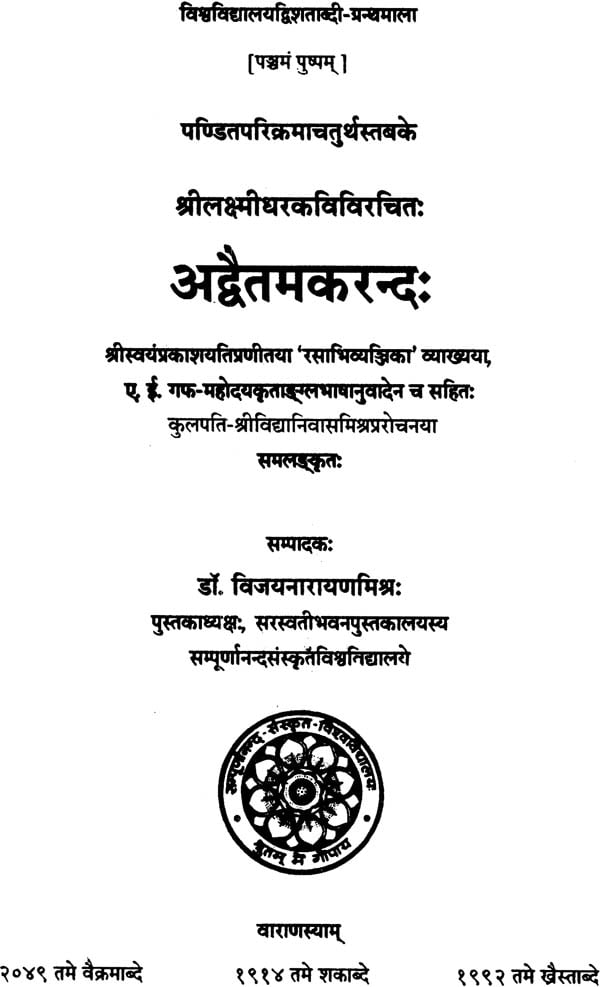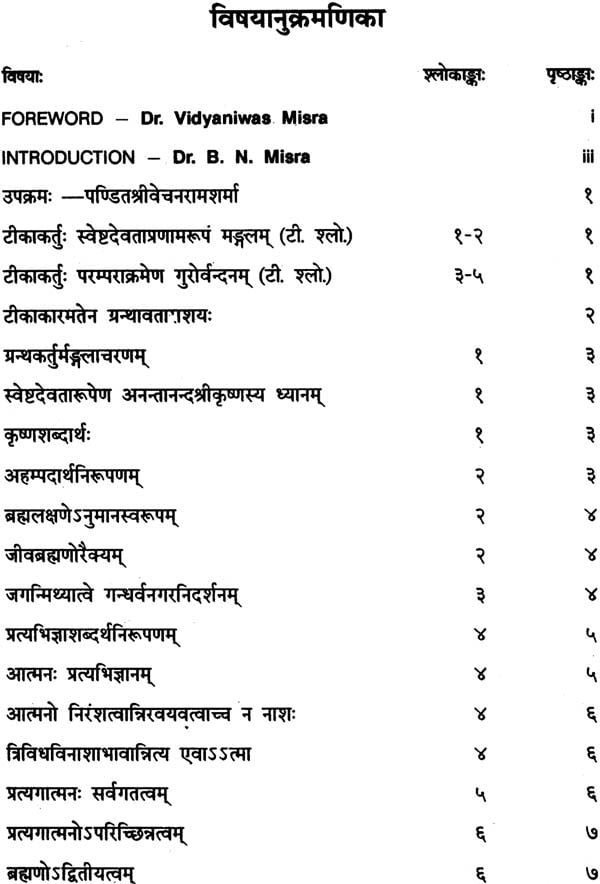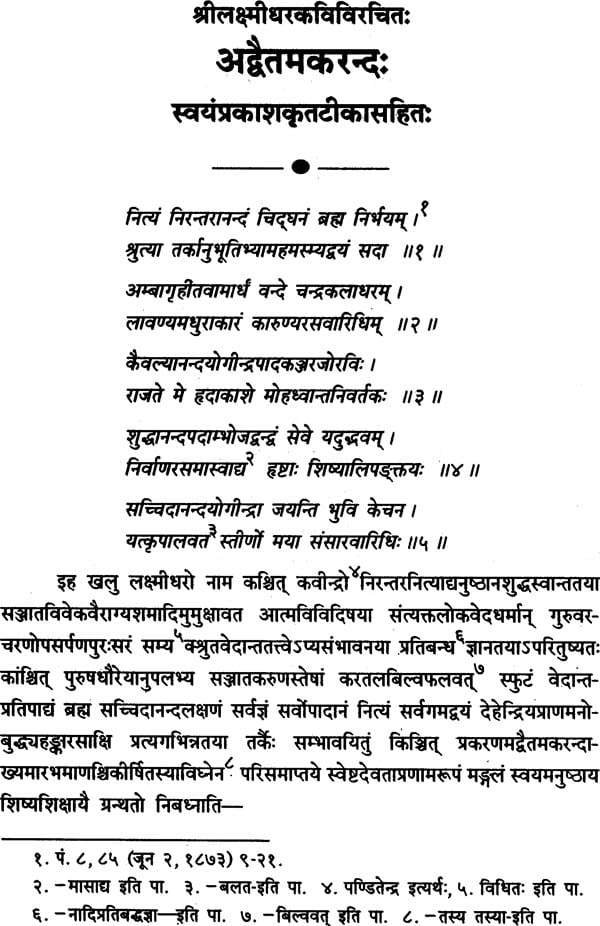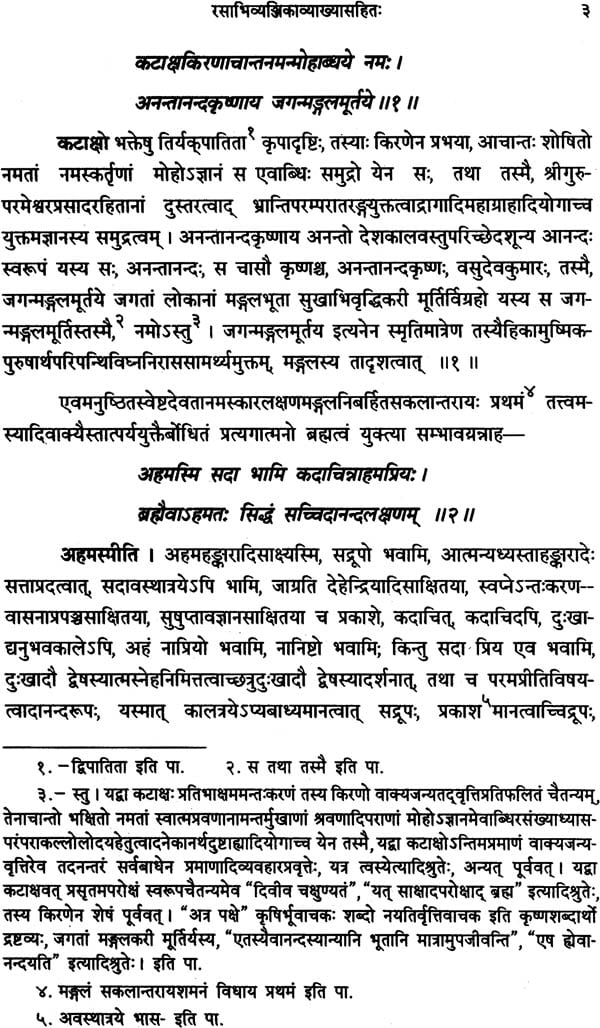
अद्वैतमकरन्द: Advaita Makranda
Book Specification
| Item Code: | NZD571 |
| Author: | श्री लक्ष्मीधर (Shri Lakshmidhar) |
| Publisher: | Sampurnanand Sanskrit University |
| Language: | Sanskrit Text with English Translation |
| Edition: | 1992 |
| Pages: | 88 |
| Cover: | Hardcover |
| Other Details | 10.0 inch X 6.5 inch |
| Weight | 320 gm |
Book Description

This small treatise or prakarana presents a summary of the Vedanta system based on doctrines of Upanisads and Sankrar. The entire text in twentyeight Anustubh verses are commented upon by Svayamprakasa-Yati in his Rasabhivyanjika given here with the text. The work was first edited by Pt. Becana Rama Sarma, Professor of Sankhya, Government Sanskrit College, Benares, and serialized in ‘The Pandit’, a monthly Sanskrit Journal of the College, in its vol. viii (1873). This also followed an English translation by A.E. Gough in the same journal (vol. viii-ix, 1873-74) in instalments. Other editious:- i. Belgaum, Abaji R. Savanta, 1896, 47p.; ii. Srirangam, Sri Vanivilasa Press 1926; iii. With a Marathi tr.. Poona. 1931.
The author Laksmidhara (fl. 1440) was the son of Narasirnha Suri and a disciple of Anantananda Raghunatha. His other two works are: Bhagavan-namkaumudi and Amrtatarangini, a commentary on the Bhagavata. The state of Brahman-realisation is discussed in glowing terms, the ecstasy of a realized soul is praised. The text is not only an epitome of Advaita , but a work with poetic charm that delight the reader.
The commentator Svayamprakasa-yati (fl. C. 17tg cent. A.D.) was a disciple of Saccidananda-Yogindra. In his commentary, he mentions Kaivalyananda and Suddhanandna as his teachers (gurus). The commentary is very lucid and logically coherent.
Indexes of verses and quotations contained in the commentary are given at the end for retrieval purposes.
Advaitamakaranda is a treatise on Advaita Vedanta written by Laksmidhara and commented upon by Svayamprakasa Yati. As indicated by its first editor Professor Becana Rama Sarma, the commentator was a disciple of Vidyaranya Muni as he himself has mentioned in the commentary itself. Professor Sarma also refers to a legend, that the author of this treatise was the father of the eminent grammarian and thinker Bhottaoji Diksita, but there is no other evidence of it. This is also not compatible with the known date of Vidyaranya. However, the posterior limit to this is the fourteenth century A.D. , since he was the family Guru of Harihara First and Bukka, the founder of the Vijayanagara kingdom. The author was a devotee of Krsna as is evident from the first mangala verse; while the commentator Svayamprakasa was a devotee of Siva.
The treatise is an elaboration of the identity of Atman with Brahman. This identity is established through twenty eight verses of the text. The commentary is very lucid and logically coherent.
This entire text along with its commentary was translated into English by A.E. Gough and published in ‘The Pandit’ volume VIII & IX, 1873-74.
I have great pleasure in publishing this small treatise on Advaita Vedanta, which deserves the attention of scholars.
Advaitamakaranada is small treatise (Prakarana) in twenty eight Anustubha verses, presenting a summary of Advaita Vedanta in the light of the doctrines of Sankara is encapsulated in the following dictum:-
‘Brahman is real, the world is phenomenal, and the soul is none else than Brahman’, Sankara’s doctrines are based upon the Upanisads and the Vedas, of which the present text provides an essence and there by proves its validity. The Upanisadic idea that knowledge of Brahman is the only cause of removal of bondage, later developed by Sankara in his works, is the main theme of this small text. Absolute Brahman, which is truth, consciousness, and bliss, is identical with Atman or the individual self. The identity is not the identity involving duality but rather an identity-in-itself. The identity of Atman and Jiva annihilates avidya (ignorance) and thereby paves the way for the attainment of liberation (moksa). The indestructible nature of the individual self is examined thread-bare in the fourth and fifth verses of the text. The author concludes this prakarana by re-emphasising the identity of Brahman and the soul. He has also discussed the nature of the Absolute (Brahman) and elucidated how the avidya (ignorance) ceases to exist by the direct experience of the Brahman arising out of hearing of the Mahavakyas and ultimately explaining the concept of Moksa (liberation).
The author Laksmidhara (fl. in 15th cent. A.D.) was the son of Narasimha and a disciple of Anantananda Raghunatha. He was a great devotee of Lord Krsna as is evident from his benedictory verse. As Brahmananda Bharti, who lived between 1325 to 1425 A.D., has quoted from Advaitamakaranada (verse 20) in his commentary on Vakyasudha, the date of our author, therefore, must be anterior to the fourteenth century A.D.
The work has been commented upon by Svayamprakasa Yati (fl. in 17th cent. A.D.) by the order of Purusottama (epilogue verse one), who seems here to be non but Narayana (Lord Visnu) himself from whom the knowledge of Advaita Vedanta proceeds. Svayamprakas was a disciple of Kaivalyananda and Suddhananda Yogindra. Of the other six commentaries of this work, the present one known as Rasabhivyanjika is more comprehensive, clear and lucid in its treatment of the text.
The work was first edited by Pandit Becana Rama Sarma, Professor of Samkhya in the Government Sanskrit College, Benares, and serialized in ‘The Pandit’ (Vol. VIII-IX 1873-1874). This was followed by an English translation by ArchibaldEdwardGough, which also appeared in the same volumes of ‘The Pandit’.
It is gratifying for me, now, to present this work again to the scholars, as the fourth-volume of the Pandita Parikrama, a series incorporating the reprint of fifty volumes of ‘The Pandit’, 1866-1971.












